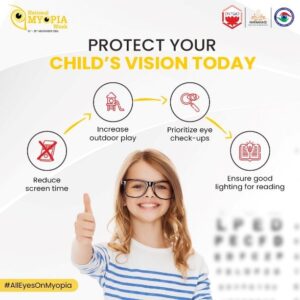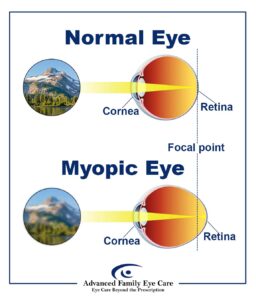NATIONAL MYOPIA WEEK: Raising Awareness for Healthier Vision in Children 

This National Myopia Week, the MATANAND Welfare Foundation, in partnership with the Strabismus and Pediatric Ophthalmological Society of India (SPOSI), is committed to raising awareness about myopia—a growing eye health issue affecting millions of children worldwide. Myopia, also known as short-sightedness or “minus number” vision, makes it difficult to see distant objects clearly and often requires corrective lenses.
Why Myopia Awareness Matters
Myopia typically appears in childhood, starting as early as age 5 and often progressing until age 18. Currently, an estimated 1 in 4 children and teens in India have myopia, a prevalence that has surged from 4% in 1999 to 25% today. At this rate, it’s predicted that by 2050, half of all children and teens may be myopic.
Children with untreated, moderate to severe myopia face an increased risk of serious eye health issues in adulthood, including early cataract development, glaucoma, and retinal detachment. Severe myopia may even restrict eligibility for certain vision correction surgeries like LASIK. Beyond the physical effects, myopia can impact a child’s cognitive development, academic performance, and social well-being.
Taking Action for Our Children’s Vision
The goal of National Myopia Week is to inform parents, caregivers, and the public about childhood myopia, its causes, and prevention. Studies show that encouraging outdoor play and reducing screen time can both prevent and slow the progression of myopia in children. Additionally, yearly eye exams are essential for early detection and treatment, giving children the best chance for a lifetime of healthy vision.
Join the Movement: #AllEyesOnMyopia
We invite everyone to be part of this awareness movement! Tag #AllEyesOnMyopia this #NationalMyopiaWeek and help spread the word about childhood myopia. Together, let’s protect our children’s vision and help them see a brighter future.



